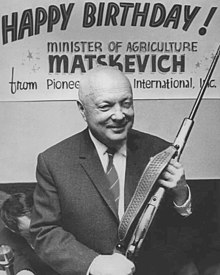
Summary
Vladimir Vladimirovich Matskevich (Russian: Владимир Владимирович Мацкевич; 14 December 1909 – 7 November 1998) was the Deputy Chairman of the Soviet Council of Ministers from 9 April 1956 to 25 December 1956.[1]

Early life edit
Matskevich was born in the village of Privolye-Marienthal, Chortitza volost (today village Prydniprovske, Zaporizhzhia Oblast, Ukraine), in the family of an agronomist. He graduated from the Kharkov Zootechnical Institute in 1932.[1]
Agriculture Minister edit
Matskevich was the Soviet Agriculture Minister from 14 October 1955 to 29 December 1960 under Nikolai Bulganin and again from 18 February 1965 to 2 February 1973 under Alexei Kosygin. Matskevich conferred with his American counterpart Secretary Earl Butz leading to a three-year, $750,000,000 deal for the Soviet Union to purchase grain from the United States. Henry Kissinger announced the deal from the "Western White House" at San Clemente on 8 July 1972. The Soviets needed to make up for agricultural shortfalls, agreeing to purchase the grain on credit at 6⅛% annual interest, the standard rate for the Commodity Credit Corporation of the U.S. Department of Agriculture.[2]
Leadership edit
Matskevich served as the Ambassador of the Soviet Union to Czechoslovakia from 27 April 1973 to 6 February 1980. He was elected to the Soviet Central Committee in the 20th, 24th, and 25th Congresses of the Communist Party, serving from 1956 to 1961 and 1971 to 1981.
References edit
- ^ a b Мацкевич Владимир Владимирович. Great Soviet Encyclopedia
- ^ "U.S.-Soviet Grain Deal", Oakland Tribune, 9 July 1972, p1; "East–West Trade: The Arrival of a New Deal", TIME Magazine, 17 July 1972


